The Pyramid of Unas, an ancient Egyptian marvel, holds the mysteries of the Fifth Dynasty. Discover its enigmatic hieroglyphs and timeless significance in the annals of history.
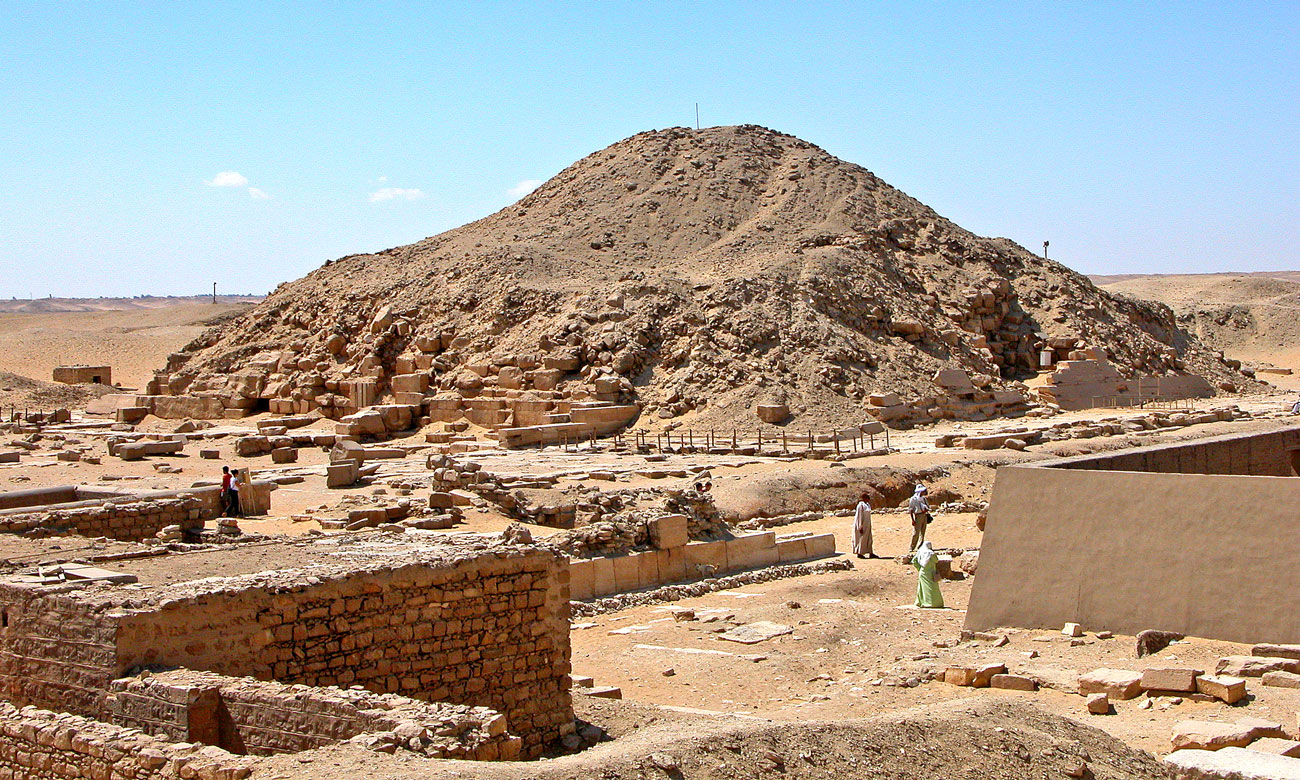
| Overview | |
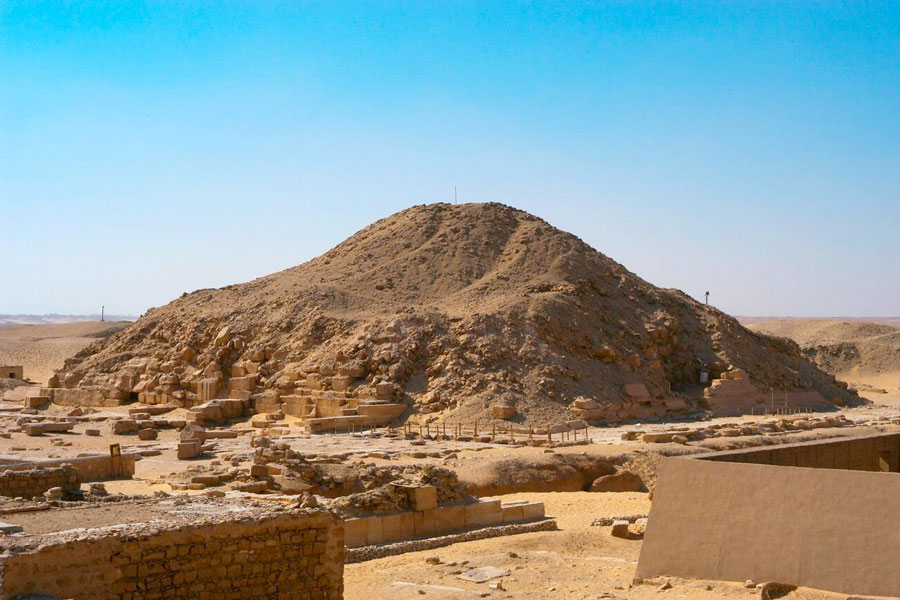
|
|
| Location | Saqqara, near Cairo, Egypt |
| History | Fifth Dynasty, Pharaoh Unas |
| Significance | Burial Site |
| High | 43 Meters |
| Base | 57.75 Meters |
| Material | Limestone |
The Pyramid of Unas is an extraordinary creation of marvelous allure and greatness rising from the golden sands near Saqqara, where an essential part of the culture, history, and art will come to life in front of your eyes. This smooth-sided pyramid of Unas was known as "Nefer Asut Unas" which means beautiful the places of Unas. It was constructed by Pharaoh Unas, the final King of the 5th dynasty of the Old Kingdom of Egypt (2575-2150 BC), to be the smallest pyramid, which will uncover a number of magnificent tales and facts.
The pyramid of Unas is highly significant besides holding the pyramid texts, which is a form of protection spells later transformed into the funerary text in the Middle Kingdom of Egypt and the Book of the Dead in the New Kingdom of Egypt. This archaeological gem is filled with a wealth of excellent knowledge about the journey of the afterlife for the royal rulers and, the power of the gods & the mythical artifacts, plus the incredible construction of that time period.

The Pyramid of Unas was built in the 24th century BC for Pharaoh Unas, who was the ninth and last ruler of the Fifth Dynasty. His pyramid is renowned for being the smallest pyramid of the Old Kingdom (2700 – 2200 BC) but holds significance for housing the first-known Pyramid Texts, which are basically spells inscribed for the protection of the king in the afterlife on its subterranean chamber walls. Unas strategically positioned his pyramid in North Saqqara, between the great complexes of Djoser and Sekhmet connected by an elaborately decorated causeway built over challenging terrain. The causeway, starting from a valley temple, repurposed old structures and tombs, including 2nd Dynasty tombs, creating a historical pathway. The site later hosted burials from the 5th to the 20th Dynasties and "Persian Tombs" which are a monument collection of the Late Period.
The causeway linked the valley temple to the mortuary temple on the eastern side of the pyramid, entered through a granite doorway possibly made by Teti Unas's successor. Adjacent to the causeway were boat pits, potentially holding the sun god Ra’s solar Barques. The mortuary temple, resembling Djedkare Isesi's layout, featured an inner temple with a ruined antechamber containing a unique quartzite column that is connected with the sun cult because of its coloration. Quartzite is considered an unusual choice for construction material which possesses a symbolic significance.
Unravel the legacy of King Teti Pyramid. Explore history, architecture, texts, and the intriguing necropolis at Teti Pyramid. Discover its wonders today!
Read MoreThe pyramid's underground chambers were discovered in 1881, revealing 283 spells constituting the smallest, oldest, and best-preserved collection of the Old Kingdom’s religious writing. The Pyramid Texts explored by Gaston Maspero aimed to guide and assist the pharaoh to eternal life and provide the ultimate means of survival. Many Egyptologists persist regarding the cult's continuity, with some suggesting it may have ended the First Intermediate Period or been revived at the Middle Kingdom. The Supreme Council of Antiquities, between 1999 and 2001, conducted a series of restorations and reconstruction projects on the valley temple plus a number of three ramps and entrances were restored.
The Pyramid of Unas is found at the Saqqara Necropolis, which is part of the Memphis Necropolis, located on a line that runs between the Pyramid of Menkauhor and the Pyramid of Sekhemkhet.
The site where the pyramid was held has an exceptionally long causeway that leads to a nearby lake. To get there, one can travel from Cairo to Saqqara, a journey of approximately 30 kilometers, or simply hire a travel agency that will take you to this epic wonder.

Unas was the ninth and final pharaoh of Egypt's Fifth Dynasty during the Old Kingdom (2345–2315 BC) and ruled for 15 to 30 years following Djedkare Isesi. His reign coincided with economic decline, which was marked by decentralized administration and a weakening of royal authority, which contributed to the eventual collapse of the Old Kingdom two centuries later.
Unas left a remarkable legacy with his pyramid in Saqqara which is the smallest of its kind from the Old Kingdom. The accompanying mortuary complex boasted lavish decorations, including painted reliefs of superior quality and variety, surpassing typical royal iconography. Unas pioneered a significant innovation by having Pyramid Texts, associating the king with Ra and Osiris, carved and painted on the chamber walls to aid in the afterlife journey.
Unas is believed to have engaged in trade deals with the Levantine coast and Nubia, with potential military actions in southern Canaan. His reign marked the continuation of the Old Kingdom's decline, characterized by administrative growth and reduced royal power. Unas had several daughters and possibly one or two sons. Unas's death signaled the end of the 5th dynasty. He was succeeded by Teti, the first pharaoh of the Sixth Dynasty, though archaeological evidence suggests a seamless transition between the two dynasties.
The funerary cult established at Unas' death persisted until the Old Kingdom's end, possibly surviving into the chaotic First Intermediate Period. Despite later pharaohs partially dismantling Unas' mortuary complex, his cult persisted into the Middle Kingdom. Unas may have been locally venerated as a god in Saqqara for centuries, lasting until the Late Period, nearly 2000 years after his death.
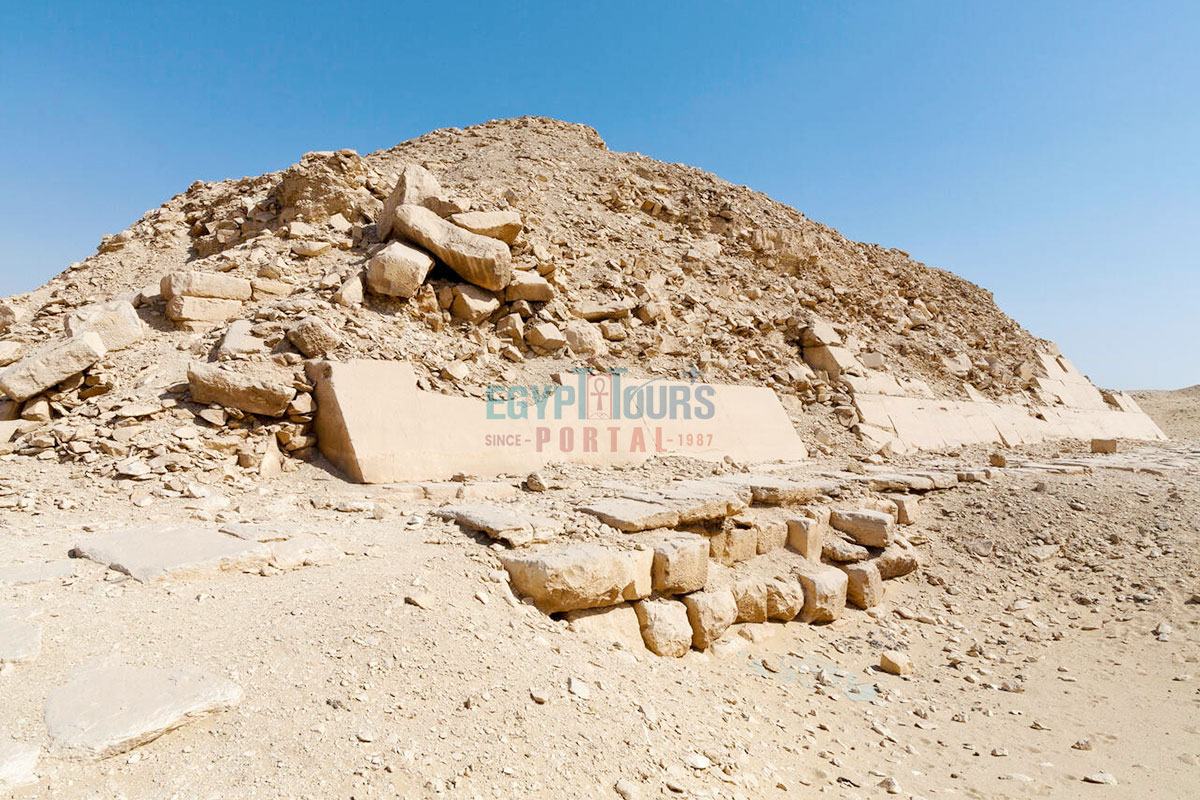
The pyramid of Unas is located southwest of Djoser's funerary complex in the north of the Saqqara step pyramid. Unas pyramid is an unassuming pile of loose blocks that stands 43 m high with a slope of 56°. The king's burial chamber measures 57.8 m to aside.
The pyramid of Unas is highly built in a manner similar to the pyramid of Djedkare. It is decorated with a ceiling adorned with stars and white alabaster-lined walls inscribed with enchanting hieroglyphs, which are known for being the earliest example of funerary inscriptions. The core of the masonry consists of accreted blocks encased with a fine limestone casing. Unfortunately, the pyramid fell into decay during the new kingdom (1570-1050 BC).
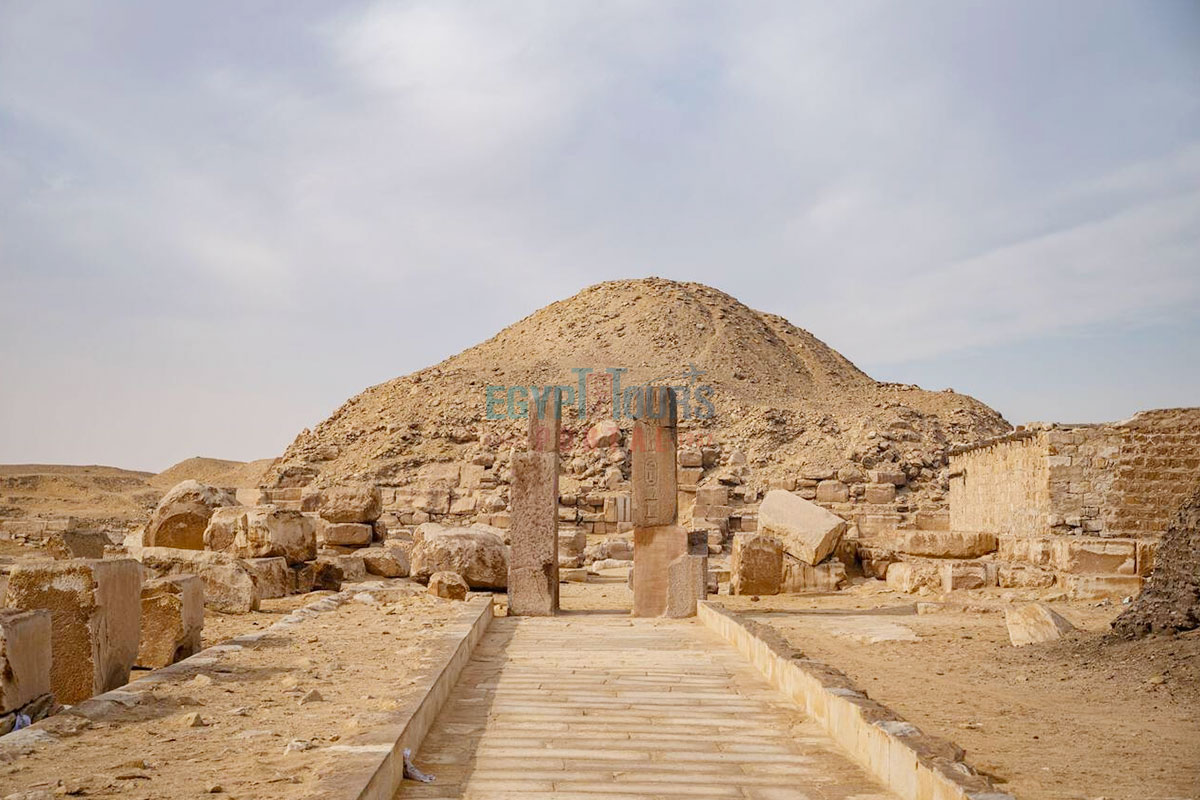
Unas's pyramid complex is found in the southwest corner of Djoser's complex in Saqqara, which showcases the quintessential components of mortuary complexes that date to the Old Kingdom. The layout includes a valley temple at the Wadi mouth, a causeway built along the Wadi's path, a mortuary temple next to Djedkare Isesi's design, a cult pyramid south of the mortuary temple, and the main pyramid. It was surrounded by a 7-meter-tall perimeter wall. The complex spans 86 meters from northeast to northwest and 76 meters from the north side to the south side.
Despite Unas's reign lasting 30-33 years, his pyramid, the smallest of the Old Kingdom, reflects resource constraints rather than time limitations. To avoid extensive quarrying, Unas kept the pyramid small, constructed in six steps using locally sourced extremely dressed limestone blocks encased with fine tura white limestone. The intact casing on the lowest steps can still be seen today, thus revealing the original grandeur. The pyramid's dimensions include a base length of 57.75 meters, converging leading to the climax at a 56° angle, resulting in a height of 43 meters upon completion. Unfortunately, like other Fifth Dynasty pyramids, Unas's has been ruined due to poor construction methods and weak materials. During the New Kingdom, pyramids were systematically dismantled for the construction of new tombs.
Breaking from tradition, Unas opted not to build pyramids for his consorts. Instead, Queens Nebet and Khenut were interred in a double mastaba located on the northeast section of the main pyramid. Despite identical tomb layouts, each queen had separate rooms and entrances. Decorated chambers highlighted their individuality. Nebet's mastaba chapel, featuring Unas's cartouche, possibly held a king's statue, while queen statues adorned the others. On the northern side of the mastaba, tombs belonging to Unas's son Unasankh and daughter Iput, along with a daughter called Hemetre, are buried on the western side of Djoser's complex.
The substructure of Unas's pyramid includes a north chapel, a vertical corridor leading to a vestibule, a horizontal passage guarded by granite slab portcullises, an antechamber, a Serdab with recesses, and the burial chamber with a gabled roof. Unas's coffin, made of greywacke, was found near the burial chamber's west wall. The burial chamber's walls were adorned with white alabaster depicting royal palace doors, symbolically allowing the king to depart in any direction.
The blue-painted ceilings in the burial chamber and antechamber, adorned with gold stars, mimicked the night sky. Traces of Unas's mummy and artifacts, including a canopic chest, were discovered, with the mummy fragments displayed in the Egyptian Museum of Cairo. The walls of the chambers featured written texts in vertical order, chiseled in bas-relief, and painted in the color blue, providing a fascinating glimpse into ancient Egyptian burial practices and construction techniques.
Explore the enigmatic Pepi I Pyramid: uncover its history, location, structure, texts, and the complex content within. Discover Pepi I's intriguing legacy.
Read MoreUnas's Valley temple is strategically located at the convergence of a wadi and a lake, forming a natural harbor. Positioned between the temples of Nyuserre Ini and Pepi II, it adheres to traditional Old Kingdom architecture.
The temple, adorned with high-quality palm granite columns, features a complex layout with a main entrance on the east side leading to halls, secondary entrances, and a main cult hall. The temple's richness in decoration aligns with the causeway and mortuary temple, showcasing exceptional craftsmanship.
The causeway linking Unas's valley temple to the mortuary temple spans an impressive length of 720 to 750 meters, rivaling Khufu's pyramid causeway. Uniquely preserved, it required intricate construction over uneven terrain and repurposed stones from Djoser's causeway. Decorated interior walls depict diverse scenes, including hunting, harvests, market activities, battles, and symbolic representations.
Notably, a scene of famished desert nomads sparked interpretations, suggesting social, climatic, or symbolic implications. The causeway also covers tombs, indicating potential tomb-robbing.
Unas's mortuary temple closely resembles Djedkare Isesi's, but a distinctive pink granite doorway added by Teti separates it from the causeway. The entrance hall, with a vaulted ceiling and alabaster floor, leads to a courtyard with eighteen pink granite columns. The inner temple, accessible through a staircase, contains storerooms, an antechamber, and a quartzite column, symbolizing sun worship.
The temple's storerooms, irregularly placed, housed offerings for the royal funerary cult. The purpose of the cult pyramid within the complex remains unclear, possibly serving symbolic or ritual roles rather than as a burial site.
Intricate details, such as reused columns in later constructions and reliefs depicting daily life, add depth to Unas's pyramid complex. The discoveries of tombs, including those of palace officials and court singers, provide a fascinating glimpse into the broader socio-cultural context of the Fifth Dynasty in ancient Egypt. Overall, the architectural and artistic elements of Unas's mortuary complex reflect the grandeur and complexity of Old Kingdom funerary practices.
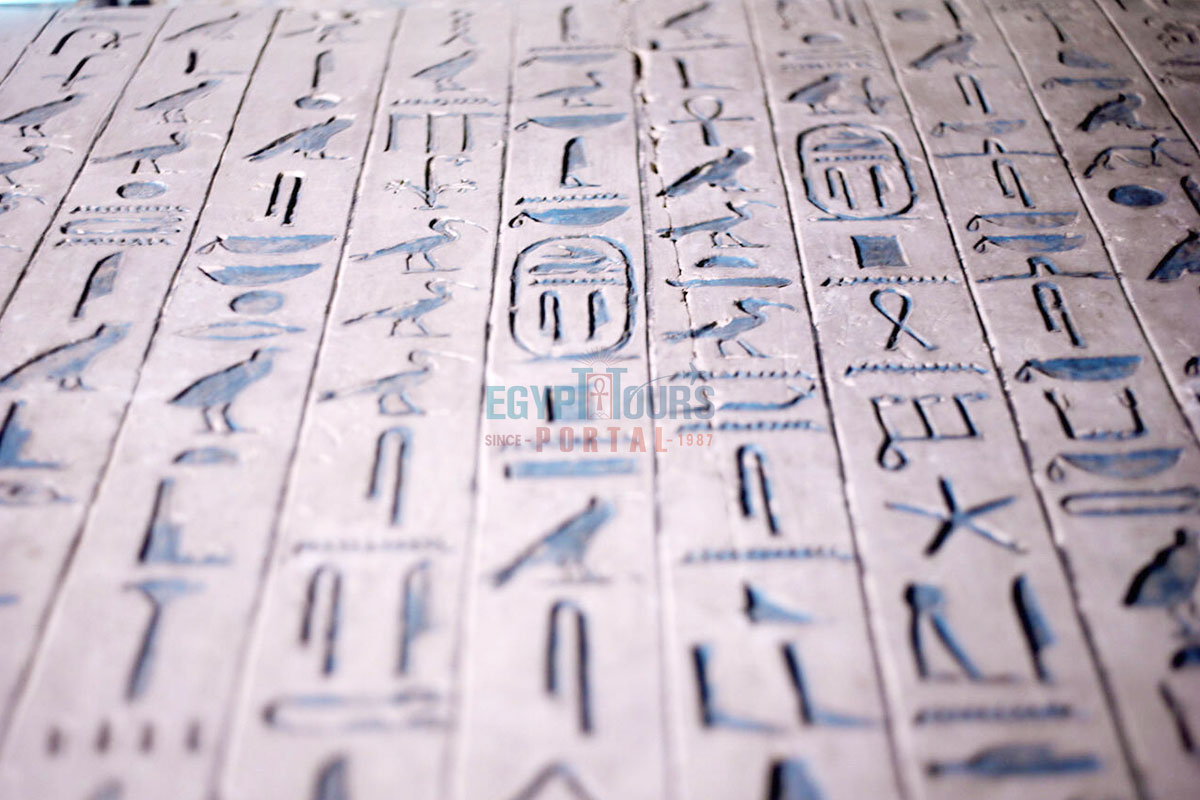
The Pyramid Texts, which are inscribed on the subterranean walls of Unas's pyramid, are the earliest known extensive religious writings in ancient Egypt of the old kingdom, which consist of 283 spells out of at least 1,000. They originated in Unas's pyramid but were found in later pyramids until the end of the Old Kingdom. The texts showcased their belief system, which involved three components of an individual: body, ka, and ba. Upon death, the Ka returned to the ancient Egyptian gods, while the ba remained with the body. The Akhet, symbolizing birth or resurrection, played a crucial role in the journey to the afterlife. The texts aimed to transform the deceased into an "Akh" for eternal life among the gods.
Unas's burial chamber inscriptions include spells protecting the sarcophagus and mummy, with rituals dedicated to offerings, resurrection, and the king's control over sustenance. The king, identified as both himself and the god Osiris, undergoes rituals connecting him to other deities. The writings on the west gable are analyzed by expert Egyptologists. The Pyramid Texts later evolved into the Coffin Texts during the Middle Kingdom, retaining old conventions and influencing the Book of the Dead in the New Kingdom. These texts persisted for two millennia before fading around the time of Christianity's adoption in the first century.
Step into the enchanting realm of ancient with unique Egypt vacation packages. Brace yourself for an odyssey through the mystique of ancient pyramids, meander along the storied Nile, and get lost in vibrant markets resonating with history. Let us sculpt your bespoke Egyptian escapade, where each instant unfurls a fresh marvel. Don't delay; reserve your spot now and fashion indelible memories that linger for eternity!
Private 4 Days Cairo Tour Packages for British Travelers 4 days Cairo Egypt Tour pac...
Tour Location: Cairo – Giza...
5 Days Cairo and Alexandria Tour Package For British Travelers 5 days Cairo and Alex...
Tour Location: Cairo/Giza/Alexandria...
6 Days Cairo, Luxor & Aswan Tour Package For British Travelers 6 days Cairo, Lux...
Tour Location: Cairo/Giza/Aswan/Luxor...
Amazing 7 Days Cairo and Hurghada Holiday for British Travelers 7 Days Cairo & H...
Tour Location: Cairo – Giza – Hurgh...
Everyone can enter the pyramid of Unas since it is open to the public. The entrance can be entered through the north side of the pyramid through the ground level.
The Pyramid Texts of Unas mention various deities, including Ra, Osiris, Anubis, and others. These texts provide insights into the pharaoh's journey through the afterlife and his interaction with the gods.
The final and 9th Pharaoh Unas belonged to the Fifth Dynasty of ancient Egypt in the 24th century BC.
The entire country of Egypt deserve to be explored with its every heavenly detail but there are places that must be seen before any other such as the breathtaking Hurghada's red sea, The wonders of Cairo the pyramids of Giza, the great sphinx, the Egyptian Museum, Khan El Khalili Bazaar, the wonders of Luxor like Valley of the Kings, Karnak & Hatshepsut temple and the wonders of Aswan such as Abu Simbel temples, Philea temple, Unfinished obelisk and The Wonders of Alexandria like Qaitbat Citadel, Pompey's Pillar and Alexandria Library. Read more about the best places to visit in Egypt.
If you want to apply for a Visa On Arrival that lasts for 30 days then you should be one of the eligible countries, have a valid passport with at least 6 months remaining and pay 25$ USD in cash, as for the E-Visa for 30 day you should have a valid passport for at least 8 months, complete the online application, pay the e-visa fee then print the e-visa to later be presented to the airport border guard. You could also be one of the lucky ones who can obtain a free visa for 90 days. Read more about Egypt travel visa.
Egypt has a variety of delicious cuisines but we recommend “Ful & Ta’meya (Fava Beans and Falafel)”, Mulukhiya, “Koshary”, a traditional Egyptian pasta dish, and Kebab & Kofta, the Egyptian traditional meat dish.
The best time to travel to Egypt is during the winter from September to April as the climate becomes a little tropical accompanied by a magical atmosphere of warm weather with a winter breeze. You will be notified in the week of your trip if the Climate is unsafe and if any changes have been made.
You should pack everything you could ever need in a small bag so you could move easily between your destinations.
We have been creating the finest vacations for more than 20 years around the most majestic destinations in Egypt. Our staff consists of the best operators, guides and drivers who dedicate all of their time & effort to make you have the perfect vacation. All of our tours are customized by Travel, Financial & Time consultants to fit your every possible need during your vacation. It doesn't go without saying that your safety and comfort are our main priority and all of our resources will be directed to provide the finest atmosphere until you return home.
You will feel safe in Egypt as the current atmosphere of the country is quite peaceful after the government took powerful measures like restructuring the entire tourist police to include all the important and tourist attractions in Egypt. Read more about is it safe to travel to Egypt.
Wear whatever feels right and comfortable. It is advised to wear something light and comfortable footwear like a closed-toe shoe to sustain the terrain of Egypt. Put on sun block during your time in Egypt in the summer to protect yourself from the sun.
The best activity is by far boarding a Nile Cruise between Luxor and Aswan or Vise Versa. Witness the beauty of Egypt from a hot balloon or a plane and try all the delicious Egyptian cuisines and drinks plus shopping in old Cairo. Explore the allure and wonders of the red sea in the magical city resorts of Egypt like Hurghada and many more by diving and snorkeling in the marine life or Hurghada. Behold the mesmerizing western desert by a safari trip under the heavenly Egyptian skies.
There are a lot of public holidays in Egypt too many to count either religious or nation, the most important festivals are the holy month of Ramadan which ends with Eid Al Fitr, Christmas and new years eve. Read more about festivals & publich holidays in Egypt.
Egypt is considered to be one of the most liberal Islamic countries but it has become a little bit conservative in the last couple of decades so it is advised to avoid showing your chest, shoulders or legs below the knees.
Arabic is the official language and Most Egyptians, who live in the cities, speak or understand English or at least some English words or phrases. Fewer Egyptians can speak French, Italian, Spanish, and German. Professional tour guides, who work in the tourism sector, are equipped to handle visitors who cannot speak Arabic and they will speak enough English and other languages to fulfill the needs of all our clients.
The fastest way is a car, of course, a taxi. If you are in Cairo ride a white taxi to move faster or you could board the fastest way of transportation in Egypt metro if the roads are in rush hour.
The temperature in Egypt ranges from 37c to 14 c. Summer in Egypt is somehow hot but sometimes it becomes cold at night and winter is cool and mild. The average of low temperatures vary from 9.5 °C in the wintertime to 23 °C in the summertime and the average high temperatures vary from 17 °C in the wintertime to 32 °C in the summertime. The temperature is moderate all along the coasts.
It is the home of everything a traveler might be looking for from amazing historical sites dating to more than 4000 years to enchanting city resorts & beaches. You will live the vacation you deserve as Egypt has everything you could possibly imagine.









